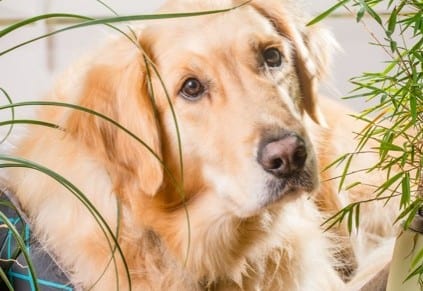Whether they’re furry or scaly, it’s important to keep pets healthy and stimulated to maintain their overall wellbeing during lock ins.
With Aussie pet parents self-isolating, working from home and distancing themselves socially, many pets may not be receiving the same level of physical activity they are used to.
Although times are uncertain, spending quality time with your pet will help to establish a stronger bond and bring comfort to you and your pet.
To help pet parents navigate self-isolation, PETstock Dog Trainer Tina Button, PETstock VET Dr Sasha Nefedova and Certified Dog Behaviourist Lara Shannon have compiled some helpful tips.
Top Tips To Keep Your Pets Healthy During Home Isolation
Use enrichment toys
An easy and effective way of keeping your pet entertained and active indoors is to use enrichment toys.
“Toys such as Kong’s, automated laser pointers, cat wands, or food puzzles are a great way to give your pet a ‘job’, keeping them mentally stimulated and entertained for hours,” says PETstock Dog Trainer Tina Button.
Create an agility course
If you are unable to purchase enrichment toys during this period, be creative and use everyday items in your home to create a fun agility course.
“Whether your pet is a dog, cat, rabbit or guinea pig, an agility course is a fun way to challenge their mind and body. This could include using an ottoman as a step, shoes as hurdles or socks to create a maze for smaller pets,” says Tina.
“Building and completing an agility course will strengthen the bond between pet and owner. Helping your pet through a course will improve the communication and trust between you.”
Create a pet-friendly treasure hunt
Certified Dog Behaviourist and TV host of Pooches At Play, Lara Shannon, says creating an indoor treasure hunt for your pet using toys or healthy treats is a clever way to keep them physically and mentally active.
“Spending more time indoors means pets aren’t exposed to as many scents as they would be when exploring outdoors. Setting up games such as a treasure hunt will encourage them to use their senses and instinct to search,” says Lara.
Training sessions
There has never been a better time to train your pet or teach them a new trick such as rolling over, begging or playing dead.
“There are many benefits to training your pet; including reinforcing positive social behaviours, improving your relationship, and challenging them mentally,” says Tina.
“Cats are intelligent animals and can be trained in a similar way to a dog to learn new tricks such as sit and shake paws.
“Food and clickers can be used to train your cat to shake paws or beg. Simply tap your cat’s paw while saying ‘shake’ or ‘beg’ and use your clicker when it moves its paw.
“Using food as a reward is a powerful tool for shaping behaviours such as sitting instead of jumping. Using food in training shouldn’t interfere with their regular food intake. However, it is recommended to monitor their daily food intake if kibble is used excessively when training.”
Grooming
While there is limited access to grooming services, it’s important that pet parents keep their pet’s coat tidy, especially heading into winter.
PETstock VET Dr Sasha Nefedova explains that brushing your pet’s coat daily will remove tangles, dirt and dead hair, as well as increase skin circulation and distribute oil.
“A dog’s winter coat can hide trouble, such as lumps, bumps or sores. As you brush, feel and look carefully for signs of illness.
“Cats, particularly long-haired, need regular brushing and grooming to prevent hairballs as well as matting to the fur.”
Show them some love
Now that we are spending more time than ever with our pets, it’s a great opportunity to forge stronger bonds with them.
“Most people and pets feel better when they have physical contact. Simply patting a pet can lower your heart rate and theirs too and helps build an unwavering friendship,” says Tina.
Monitoring signs of anxiety and stress
It’s important to monitor your pet’s mental health during self-isolation.
“A few common changes that may indicate an anxious pet include excessive licking of lips, panting, turning away, excessive yawning or a sudden disinterest in food,” says Dr Nefedova.
“Anxious pets benefit with quiet time. Teach them to lay down in their bed or mat nearby to relax,” says Tina.
General Health Check
“If your pet shows any signs of illness or injury during isolation, including a split paw, lethargy, vomiting, excessive thirst, or diarrhoea, please contact your vet,” says Dr Nefedova.
Customers can call 13 PETS for more information or alternatively video chat with a veterinarian in Australia 6am to midnight from the comfort of your own home on PETstock’s Vet Chat service.
What are you doing to keep your pets healthy? Tell us in the comments below.




















10:52 am
11:57 am
9:44 am
3:48 pm
2:42 pm
8:49 am
7:40 am
9:01 pm
6:47 pm
7:15 am
-

-
-
mom93821 replied
- 02 May 2020 , 3:57 am
Reply6:14 am
11:02 pm
10:00 pm
9:42 pm
7:02 pm
6:55 pm
6:05 pm
5:39 pm
5:29 pm
5:05 pm
-

-
-
Ellen replied
- 01 May 2020 , 4:07 am

Reply- 1
- 2
- »
Post a commentTo post a review/comment please join us or login so we can allocate your points.